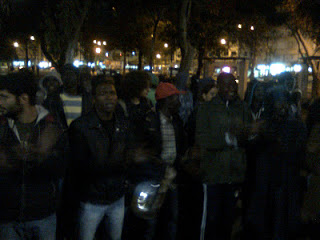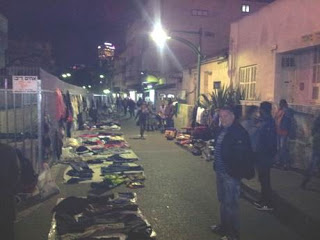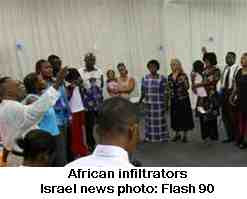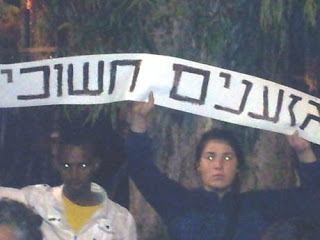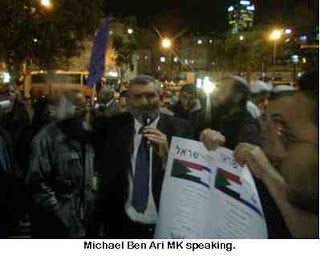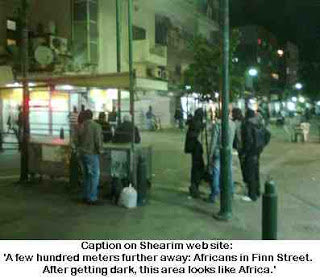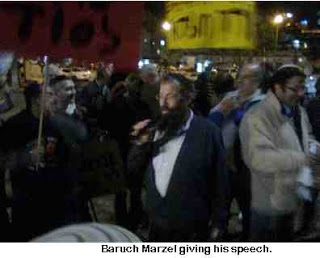The report on the settler news site, Arutz Sheva said it all. Describing Sudanese refugees as ‘infiltrators’ we are told that ‘Many of them end up residing in the central bus station in Tel Aviv. The area looks surrealistically like an African country, in terms of population, stores and atmosphere.’
Now where have we heard this type of language before? Ah yes, circa 1933. And who was it said about? Yup, the Jews no less: ‘Poland for the Polish – Jews to Palestine’. Interesting how these things come around and how Israel has managed to replicate and worse, just about everything the anti-Semites used to do.
Israel’s only saving grace is that it hasn’t yet embarked on a systematic extermination, although there are those in the Orthodox religious sector, Lubavitch in particular, who look forward to death camps for Palestinians.
Of course some will say that anti-immigrant feeling in Israel is no different from any other country. But this isn’t true. In Europe it will generally be about refugees ‘taking’ jobs, benefits etc. Which of course is bad enough but can be fought along the lines that trade unions have traditionally done. But in Israel it is a different debate. About preserving the ‘Jewish’ nature of the state. That is the context in which this is occurring. And there is of course no court system to determine whether or not they are genuine refugees or not, because that is besides the point. What matters is that they aren’t Jewish.
Tony Greenstein
The Israeli newspaper Haaretz mysteriously removed from its website an article exposing atrocious Israeli racism against black people just hours after it was published.
The article by David Sheen – a copy of which was made by The Electronic Intifada before Haaretz deleted it – reported on a rally by Israeli Jews on Sunday in Tel Aviv against African immigrants, demanding that they be sent home because Israel is a “Jewish state.” The rally was addressed by Michael Ben-Ari, a member of the Israeli parliament from the National Union party which also favors expelling Palestinians.
We have come to expunge the darkness
The deleted article stated:
The demonstrators chanted “The people demand the expulsion of the infiltrators,” “We have come to expunge the darkness,” and “Tel Aviv is for Jews, Sudan is for Sudanese.”
Ben Ari criticized Prime Minister Netanyahu for allowing African migrants to remain in the county after they had already entered in recent years. He called Netanyahu’s cabinet “the blackest government ever for Tel Aviv.”
Shocking video of hate rally
Video taken at the rally and posted on YouTube by Sheen, shows some of the vile racism, including by Knesset member Michael Ben-Ari.
Protesters can be heard chanting such slogans as, “Sudanese to Sudan, Tel Aviv is for Jews” and “Their place is in Sudan, not here. This is a Jewish state!”
“Restrict their movements”
Ben-Ari apparently referring to some nearby counter-demonstrators said: “I can see them over there, those who want to destroy our country. I see those who are setting up a welcome tent for the millions of Africans who are on their way here and I tell them it’s no use, our response is the Jewish nation lives!”
Ben-Ari and several protesters then broke into singing the nationalist refrain, “The Jewish nation lives.”
Ben-Ari then praised the mayor of the Red Sea port city of Eilat for his alleged harsh treatment of Africans. The mayor, Ben-Ari said, “is doing a great job with the Africans there. I only wish we did the same here in Tel Aviv. He doesn’t allow them to attend schools, he restricts their movements, he knows what to do.”
Africans ‘bad for property values’
The handful of counter-demonstrators calling for an end to racism are confronted by some of the protestors and one woman shouts: “Disgusting! Why should my son go to school with 30 Sudanese in a class?”
The same woman adds, “Let’s see you take them back home to your neighborhood and then we’ll see you complain that your property values are dropping.”
Why did Haaretz delete the article?
It is very unusual for a publication to delete an article without explanation after it is published. Responding to my questions on Twitter, Sheen suggested it was because the article was no longer “newsy,” coming 24 hours after the rally.
While this may be what the Haaretz editors told Sheen, it is far from convincing. In a professional publication, such decisions are made before an article appears, not after.
